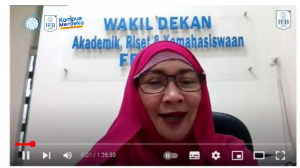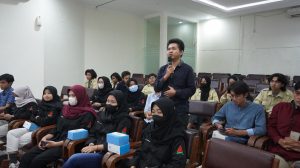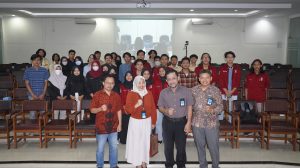FEB UNS Students Participated in the Dissemination of Academic Senate Rules on Student Code of Conduct
The dissemination of the Code of Ethics is the second activity held by the Faculty of Economics and Business (FEB), Universitas Sebelas Maret (UNS) to disseminate the UNS Academic Senate Regulation (PSA) to the FEB UNS academic community, especially students.
 Previously, dissemination on the Prevention and Handling of Sexual Violence (PPKS) had been carried out. In the future, there will be another dissemination on PSA on scientific autonomy and academic tribune.
Previously, dissemination on the Prevention and Handling of Sexual Violence (PPKS) had been carried out. In the future, there will be another dissemination on PSA on scientific autonomy and academic tribune.
The statement was conveyed by the Vice Dean of Academic Research and Student Affairs FEB UNS, Prof. Dr. Izza Mafruhah, SE M.Si., when delivering a remark at the Academic Senate Dissemination on Student Code of Conduct on Thursday, April 6, 2023 at the Konimex Hall of Bachtiar Effendi Building and Zoom Cloud Meeting.
“In PSA, mostly or even almost all activities have been regulated, therefore, we need to take a stance on how we react, how to determine punishment and also reward when there are cases or problems related to violations or fulfillment of the code of ethics. These aspects need to be understood by students,” she said.
Prof. Izza hopes that when students carry out teaching and learning activities, both curricular and non-curricular, they will always be in a straight line, a line that is in accordance with the guidelines and rules applicable at UNS.
According to her, so far there have been several complaints from lecturers regarding student ethics, possibly due to the influence of online learning for the past 2 years. With this enlightenment activity, there are no more students who violate the norms that exist on campus.
Dr. Sunny at the beginning of her material presentation in front of the Head of the Study Program, Ormawa (students organization) manager, and students representative attending the hybrid agenda, said that Academic Senate Regulation 17 of 2021 is not a prohibition, but what should be done, thus, each action will not be detrimental to others even though it is actually our right.
“One thing we need to understand together is that at the higher education level, all academic members, both employee lecturers, and students, are expected to be able to instill and build a value system in the campus environment,” she explained.
 According to her, each campus has its own code of ethics that must be fulfilled and implemented and must not be violated by the Academic community. Every university has a code of ethics that is not necessarily the same.
According to her, each campus has its own code of ethics that must be fulfilled and implemented and must not be violated by the Academic community. Every university has a code of ethics that is not necessarily the same.
“Why should we follow this code of ethics? The code of ethics has been formulated in such a way as to allow the teaching and learning process, the process of character formation, to run in accordance with expectations. Because we believe this code of ethics is not issued solely because it is important to have a code of ethics, but there is a purpose. The learning objectives of character building are in accordance with what is the vision and mission of UNS,” she explained.
Dr. Sunny summarizes the elaboration of the code of ethics into four points, the first is the ethics of integrity, loyalty, and courtesy and decency, which were combined into one material. The second is lecture ethics, the preparation of scientific works and examinations. The third is the ethics for building relationships with the academic environment, with lecturers, students, education staff, and relationships with the community. And the fourth is the ethics for student activities.

